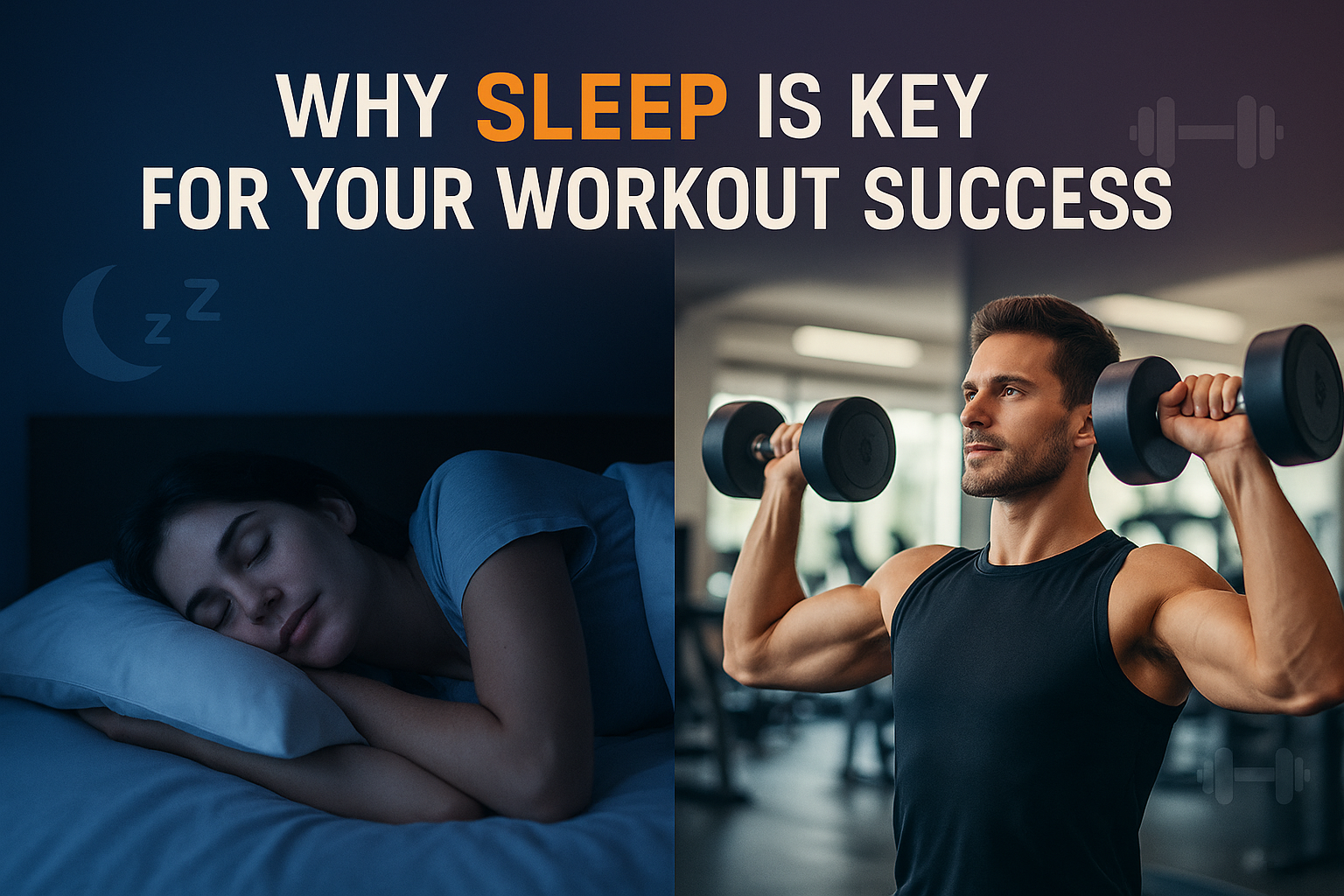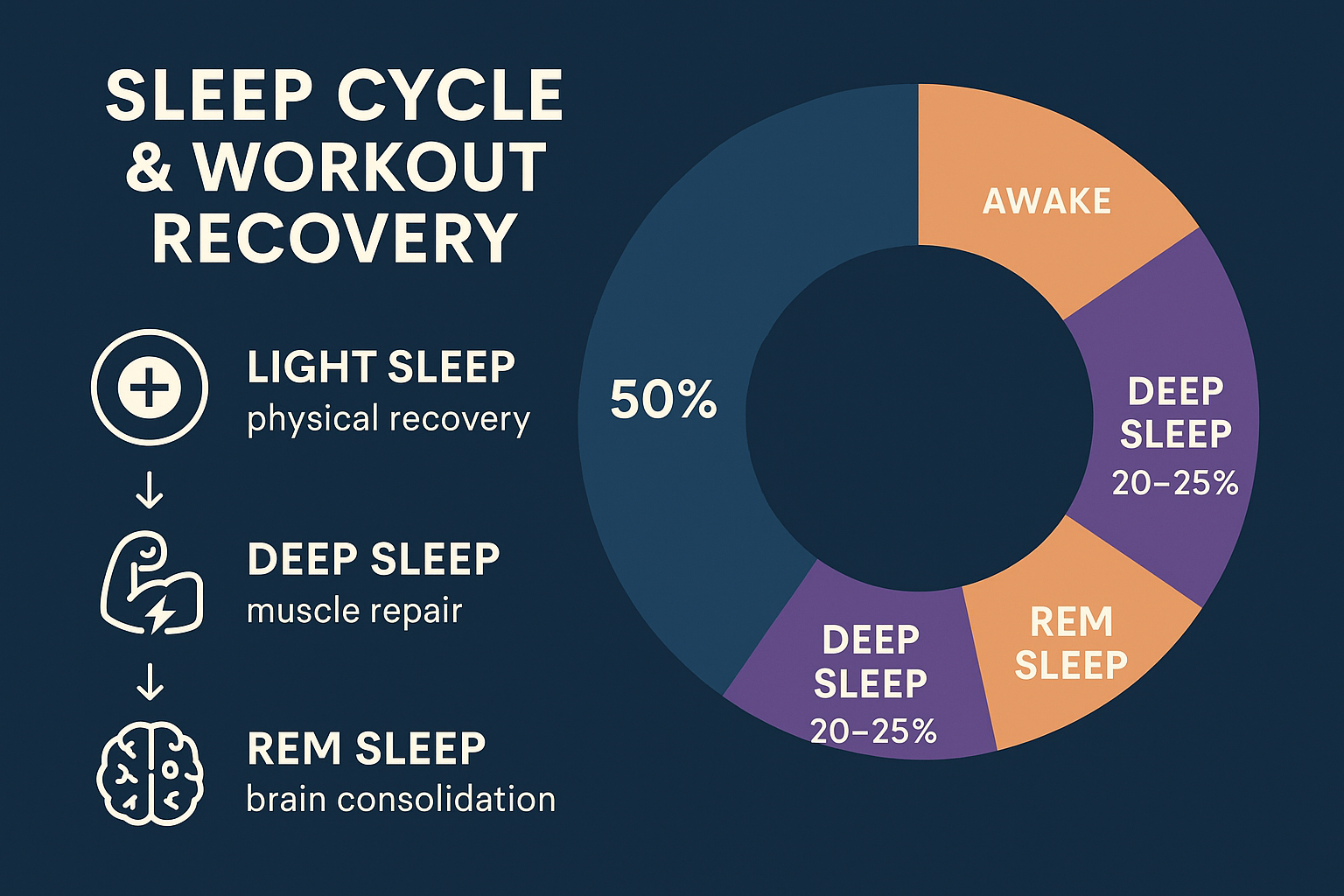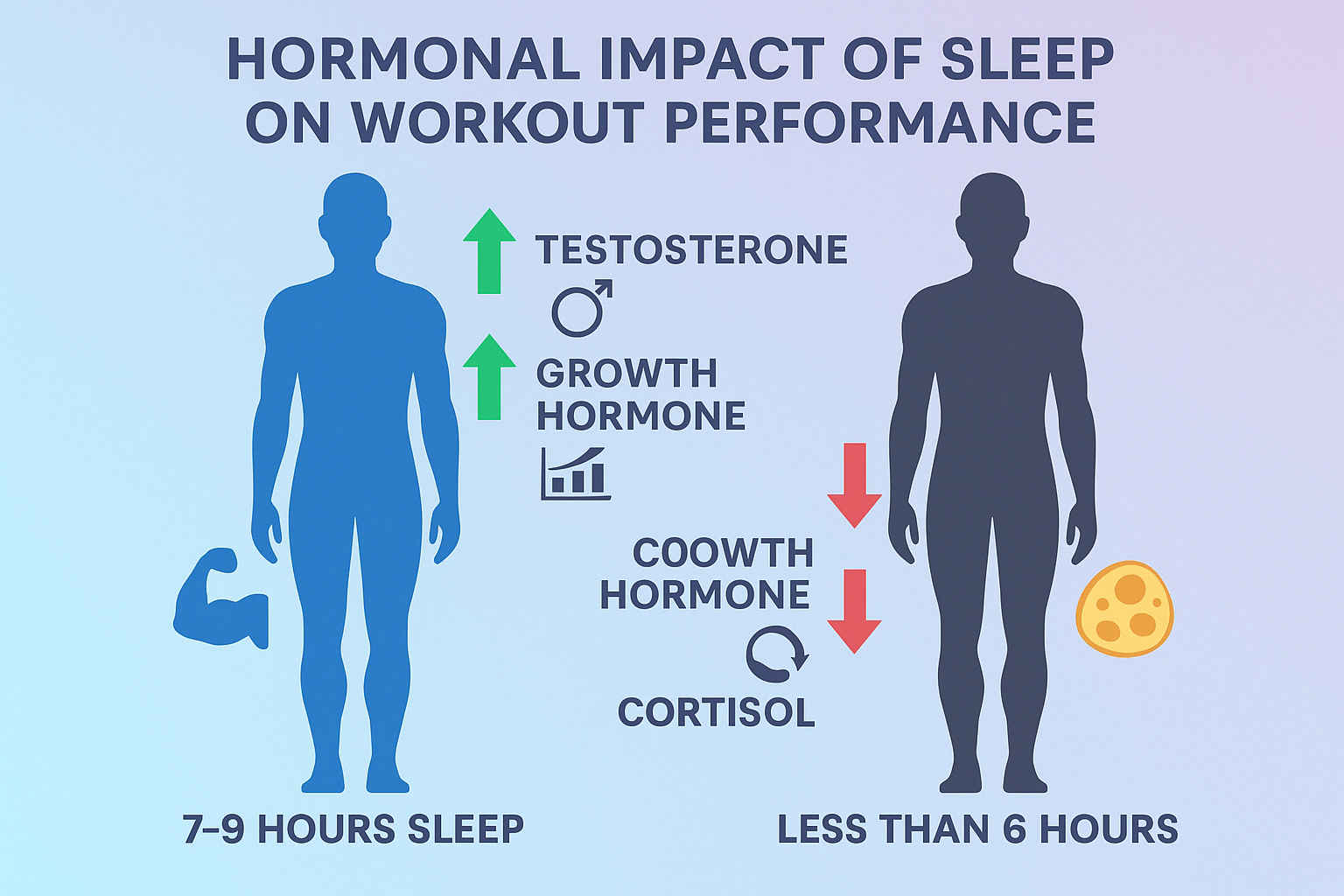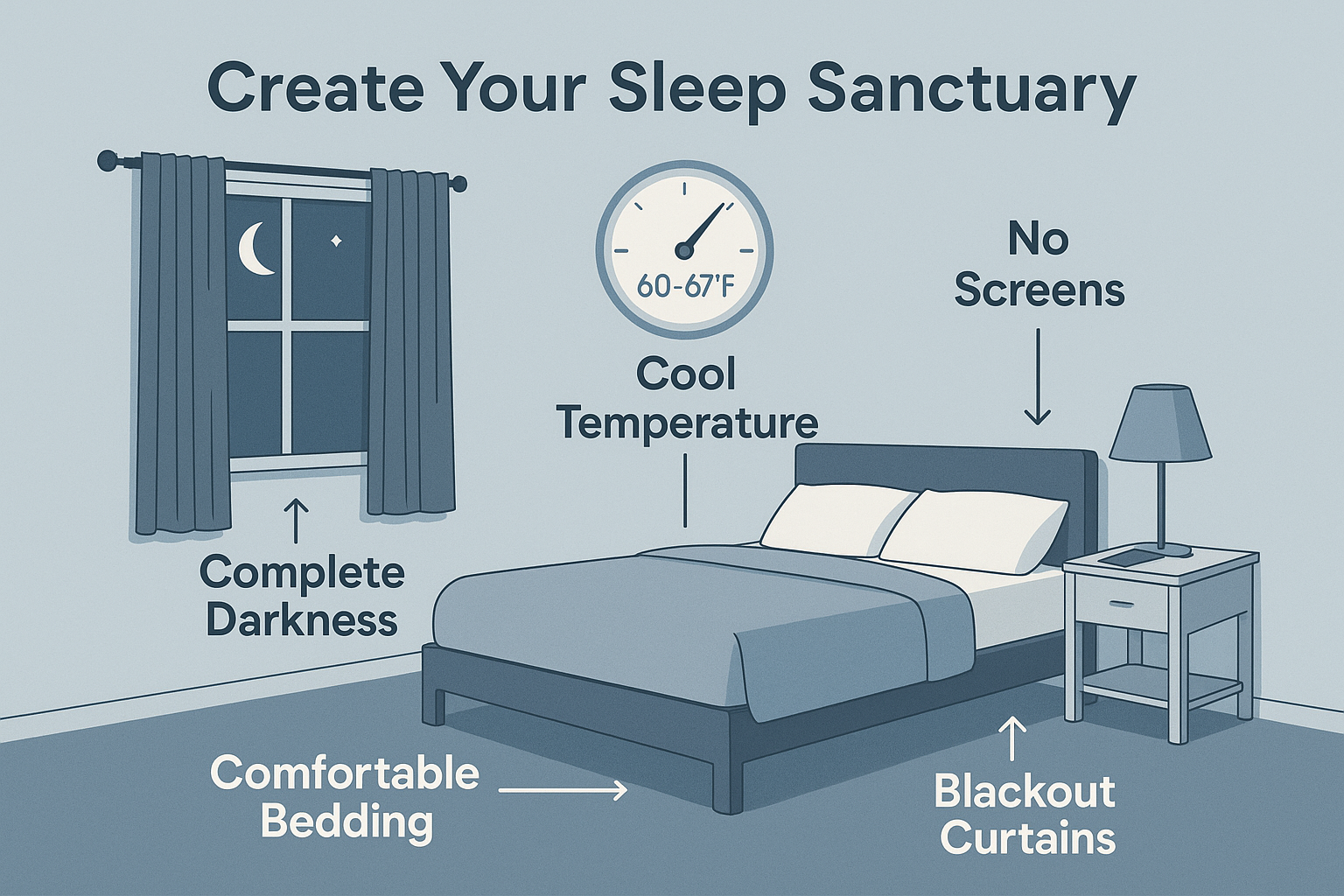Ever wonder why some people seem to crush their fitness goals while others struggle despite putting in the hours at the gym? Here’s a secret that might surprise you: the answer isn’t always about what happens during your workout—it’s about what happens while you’re asleep.
Picture this: You’ve just finished an intense arm toning workout, nailed those dumbbell shoulder exercises, and pushed through a challenging upper body strength session. You feel accomplished, sore, and ready to see results. But here’s the truth—all that hard work could be going to waste if you’re skimping on sleep.
Sleep isn’t just downtime for your body. It’s when the real magic happens. Your muscles repair, your hormones rebalance, and your brain consolidates everything you learned during that new training routine. In 2025, as we understand more about exercise science than ever before, one thing is crystal clear: sleep workout success is not just connected—it’s inseparable.
Key Takeaways

- 💪 Muscle recovery and growth happen primarily during deep sleep stages, making quality rest essential for workout results
- ⚡ Sleep deprivation reduces athletic performance by up to 30%, affecting strength, endurance, and reaction time
- 🧠 Poor sleep disrupts hormone balance, increasing cortisol (stress hormone) and decreasing testosterone and growth hormone
- 🎯 7-9 hours of quality sleep is the sweet spot for optimal workout recovery and performance
- 🔄 Sleep and exercise have a bidirectional relationship—better sleep improves workouts, and better workouts improve sleep
The Science Behind Sleep Workout Success
How Sleep Affects Your Body’s Recovery Process
When you exercise—whether you’re doing an arm toning workout or heavy dumbbell shoulder exercises—you’re essentially creating tiny tears in your muscle fibers. This might sound bad, but it’s actually how muscles grow stronger. The catch? This repair work happens almost exclusively while you sleep.
During the deeper stages of sleep, your body releases growth hormone, which plays a crucial role in:
- Muscle repair and regeneration
- Bone strengthening
- Fat metabolism
- Tissue growth
Without adequate sleep, this recovery process gets interrupted. It’s like trying to renovate a house but only having access to it for a few hours instead of the full night. The job simply doesn’t get done properly.
The Hormonal Connection
Sleep deprivation wreaks havoc on your hormonal balance, and this directly impacts your workout success. Here’s what happens when you don’t get enough rest:
Cortisol Levels Spike 😰
Cortisol, your body’s primary stress hormone, increases when you’re sleep-deprived. Elevated cortisol:
- Breaks down muscle tissue
- Promotes fat storage (especially around the midsection)
- Suppresses immune function
- Increases inflammation
Testosterone and Growth Hormone Plummet 📉
Both of these anabolic hormones are crucial for building muscle and burning fat. Studies show that men who sleep only 5 hours per night have significantly lower testosterone levels than those who get 8 hours. Women are affected too—growth hormone production drops dramatically with poor sleep, regardless of gender.
Ghrelin and Leptin Get Out of Balance 🍔
Sleep deprivation increases ghrelin (the hunger hormone) and decreases leptin (the satiety hormone). This hormonal imbalance makes you:
- Feel hungrier throughout the day
- Crave high-calorie, sugary foods
- Have difficulty recognizing when you’re full
How Poor Sleep Sabotages Your Workout Performance
Reduced Strength and Power Output
Research consistently shows that sleep-deprived athletes experience significant decreases in performance. One study found that basketball players who extended their sleep to 10 hours per night improved their:
- Sprint times by 5%
- Shooting accuracy by 9%
- Reaction times significantly
- Overall mood and energy levels
When it comes to upper body strength training, sleep deprivation means you’ll struggle to:
- Lift your usual weights
- Complete your normal number of reps
- Maintain proper form (increasing injury risk)
- Push through challenging sets
Decreased Endurance and Stamina
Sleep debt doesn’t just affect strength—it hammers your cardiovascular performance too. Studies show that even moderate sleep restriction (getting 6 hours instead of 8) leads to:
- Earlier onset of fatigue during exercise
- Reduced time to exhaustion
- Lower VO2 max (maximum oxygen uptake)
- Decreased motivation to push through tough workouts
Impaired Motor Skills and Coordination
Ever notice how everything feels “off” when you’re tired? That’s because sleep deprivation impairs:
- Fine motor control (crucial for proper form during dumbbell shoulder exercises)
- Balance and stability
- Reaction time
- Decision-making abilities
This doesn’t just hurt your performance—it significantly increases your risk of injury. Poor form during an arm toning workout might seem minor, but it can lead to chronic issues down the line.
The Mental Game: Sleep’s Impact on Motivation and Focus

Willpower and Exercise Adherence
Let’s be honest: sometimes the hardest part of working out is just showing up. Sleep plays a massive role in your motivation and willpower.
When you’re well-rested:
✅ You’re more likely to stick to your workout schedule
✅ You have better self-control around food choices
✅ You can push through mental barriers during tough exercises
✅ You maintain a positive attitude about your fitness journey
When you’re sleep-deprived:
❌ Everything feels harder
❌ You’re more likely to skip workouts
❌ You make poor nutritional choices
❌ You lose sight of your long-term goals
Cognitive Function and Learning New Skills
Learning a new exercise routine—like mastering proper form for dumbbell shoulder exercises—requires cognitive function. Sleep is when your brain consolidates motor learning and creates muscle memory.
“Sleep is the single most effective thing we can do to reset our brain and body health each day.” — Dr. Matthew Walker, Sleep Scientist
Without adequate sleep, you’ll:
- Take longer to learn new movement patterns
- Make more technical errors
- Struggle to remember workout sequences
- Have difficulty focusing during complex exercises
How Much Sleep Do You Actually Need for Workout Success?
The Magic Number
While individual needs vary slightly, research consistently points to 7-9 hours as the optimal range for most adults. Athletes and those engaged in intense training may benefit from the higher end of this range or even slightly more.
Here’s a breakdown by training intensity:
| Training Level | Recommended Sleep | Why |
|—————-|——————|—–|
| Light exercise (2-3 days/week) | 7-8 hours | Standard recovery needs |
| Moderate training (4-5 days/week) | 8-9 hours | Increased recovery demands |
| Intense training (6-7 days/week) | 8-10 hours | Maximum recovery required |
| Competition/peak training | 9-10+ hours | Elite recovery and performance |
Quality Matters as Much as Quantity
It’s not just about the hours you spend in bed—it’s about the quality of those hours. Your sleep cycles through different stages:
Light Sleep 😴
- Transition phase
- Easy to wake from
- About 50% of total sleep
Deep Sleep 💤
- Physical recovery happens here
- Growth hormone released
- Immune system strengthened
- About 20-25% of total sleep
REM Sleep 🧠
- Mental recovery and consolidation
- Emotional processing
- Motor learning solidified
- About 20-25% of total sleep
For optimal workout success, you need adequate time in both deep and REM sleep stages.
Practical Strategies to Optimize Sleep for Workout Success
Create a Sleep-Friendly Environment
Your bedroom should be a sanctuary designed for quality rest:
🌡️ Temperature: Keep it cool (60-67°F or 15-19°C)
🌑 Darkness: Use blackout curtains or a sleep mask
🔇 Quiet: Consider earplugs or white noise
🛏️ Comfort: Invest in a quality mattress and pillows
Timing Your Workouts Strategically
When you exercise can significantly impact your sleep quality:
Morning Workouts ☀️
- Boost alertness throughout the day
- Establish consistent routine
- Don’t interfere with sleep
- May improve deep sleep quality
Afternoon Workouts 🌤️
- Body temperature is optimal
- Strength peaks in late afternoon
- Good balance for sleep
Evening Workouts 🌙
- Can be energizing for some
- Should finish 2-3 hours before bed
- May interfere with sleep if too intense or too late
Pro Tip: If you do evening arm toning workouts or upper body strength sessions, try to finish at least 2-3 hours before bedtime to allow your body temperature and adrenaline to decrease.
Develop a Consistent Sleep Schedule
Your body loves consistency. Going to bed and waking up at the same time every day—yes, even on weekends—helps regulate your circadian rhythm.
Benefits of consistency:
- Fall asleep faster
- Experience better quality sleep
- Wake feeling more refreshed
- Improve workout performance
Pre-Sleep Routine for Athletes
Create a wind-down routine that signals to your body it’s time to rest:
60 minutes before bed:
- Finish any intense activities
- Dim the lights in your home
- Turn off screens (or use blue light filters)
30 minutes before bed:
- Take a warm shower or bath
- Do gentle stretching or foam rolling
- Practice relaxation techniques (meditation, deep breathing)
- Read something light and enjoyable
Right before bed:
- Ensure room is cool and dark
- Put phone on silent (or in another room)
- Focus on relaxing thoughts
Nutrition and Hydration for Better Sleep
What you eat and drink affects your sleep quality:
Sleep-Promoting Foods 🥝
- Tart cherries (natural melatonin)
- Kiwi fruit
- Fatty fish (omega-3s)
- Nuts and seeds (magnesium)
- Turkey (tryptophan)
Foods and Drinks to Avoid ⚠️
- Caffeine after 2 PM
- Alcohol (disrupts sleep architecture)
- Large meals within 3 hours of bedtime
- Excessive fluids before bed
- High-sugar foods
Post-Workout Nutrition Timing
After an intense dumbbell shoulder exercises session or arm toning workout, your body needs fuel. However, timing matters:
- Eat a balanced meal with protein and carbs within 2 hours post-workout
- If working out late, keep the post-workout meal lighter
- Include sleep-promoting nutrients when possible
The Bidirectional Relationship: How Exercise Improves Sleep

Here’s the good news: while sleep improves workout success, exercise also dramatically improves sleep quality. It’s a beautiful positive feedback loop.
How Exercise Enhances Sleep
Regular physical activity:
📊 Increases deep sleep time by up to 75%
⏱️ Reduces time to fall asleep by an average of 13 minutes
😴 Decreases nighttime awakenings
💪 Reduces symptoms of sleep disorders like sleep apnea and insomnia
The Best Types of Exercise for Sleep
Different workouts affect sleep differently:
Aerobic Exercise 🏃
- Most studied for sleep benefits
- Moderate-intensity works well
- Consistency is key
Resistance Training 🏋️
- Upper body strength work and arm toning workouts improve sleep
- May be especially beneficial for deep sleep
- Don’t neglect this for sleep quality
Yoga and Stretching 🧘
- Reduces stress and anxiety
- Promotes relaxation
- Particularly beneficial before bed
Combined Approach 🎯
Mix different types of training throughout the week for optimal sleep and fitness benefits.
Common Sleep Mistakes That Hurt Your Workout Progress
The “Sleep Debt” Myth
Many people think they can “catch up” on sleep during weekends. While sleeping in can help slightly, chronic sleep debt accumulates and can’t be fully repaid with a couple of long sleep sessions.
The impact of ongoing sleep debt:
- Persistent fatigue
- Reduced muscle gains
- Slower fat loss
- Increased injury risk
- Compromised immune function
Relying on Stimulants
Reaching for energy drinks or excessive caffeine to power through workouts when tired creates a vicious cycle:
- Poor sleep leads to fatigue
- Caffeine masks tiredness
- Caffeine disrupts sleep later
- Sleep gets worse
- More caffeine needed
Better approach: Address the root cause (insufficient sleep) rather than masking symptoms.
Inconsistent Sleep Patterns
Your body’s circadian rhythm thrives on consistency. Varying your sleep schedule by more than an hour or two:
- Disrupts hormone regulation
- Reduces sleep quality
- Impairs recovery
- Decreases workout performance
Ignoring Sleep Disorders
If you consistently struggle with sleep despite good habits, you might have an underlying sleep disorder:
Common disorders affecting athletes:
- Sleep apnea (breathing interruptions)
- Restless leg syndrome
- Insomnia
- Circadian rhythm disorders
Don’t hesitate to consult a sleep specialist if you suspect a disorder. Treating it could be the game-changer for your workout success.
Tracking Your Sleep for Better Results
What to Monitor
Understanding your sleep patterns helps optimize them:
Quantity Metrics 📊
- Total sleep time
- Time to fall asleep
- Number of awakenings
- Wake time consistency
Quality Indicators ⭐
- How rested you feel upon waking
- Energy levels throughout the day
- Workout performance
- Recovery rate
Correlations to Track 🔍
- Sleep duration vs. workout performance
- Sleep quality vs. muscle soreness
- Bedtime consistency vs. energy levels
Tools and Methods
Sleep Tracking Apps and Devices 📱
- Wearable fitness trackers
- Smartphone apps
- Dedicated sleep monitors
- Smart mattress covers
Simple Sleep Diary 📝
- Bedtime and wake time
- Sleep quality rating (1-10)
- Notable factors (stress, caffeine, late workout)
- Next-day performance notes
Performance Markers 💪
- Workout intensity you can maintain
- Weight lifted in strength sessions
- Recovery time between sets
- Overall motivation levels
Creating Your Sleep Workout Success Plan

Step 1: Assess Your Current Situation
Be honest about your current sleep habits:
- How many hours do you typically sleep?
- Is your schedule consistent?
- How’s your sleep quality?
- What’s your current workout performance like?
Step 2: Set Realistic Sleep Goals
Don’t try to go from 5 hours to 9 hours overnight. Gradually increase:
Week 1-2: Add 15-30 minutes to current sleep time
Week 3-4: Add another 15-30 minutes
Week 5+: Maintain your target sleep duration
Step 3: Implement Sleep Hygiene Practices
Choose 2-3 practices to start with:
- Set a consistent bedtime
- Create a wind-down routine
- Optimize your bedroom environment
- Adjust workout timing if needed
Step 4: Monitor and Adjust
Track your sleep and workout performance for at least 2-3 weeks:
- Note improvements in energy
- Record workout performance changes
- Adjust practices that aren’t working
- Double down on what helps
Step 5: Make It Sustainable
The goal is creating lifelong habits, not a temporary fix:
✨ Build systems, not just motivation
✨ Make sleep a non-negotiable priority
✨ Adjust as life circumstances change
✨ Celebrate improvements, however small
Real-World Success Stories
The Strength Trainer’s Breakthrough
Mark, a 35-year-old focused on upper body strength, hit a frustrating plateau. Despite perfect nutrition and progressive overload in his dumbbell shoulder exercises, he wasn’t gaining strength.
The problem: He was averaging 5-6 hours of sleep, thinking he was “too busy” for more.
The solution: He committed to 8 hours of sleep nightly for one month.
The results:
- Bench press increased by 15 pounds
- Recovery between workouts improved dramatically
- Lost 3% body fat without changing diet
- Energy levels soared
The Busy Professional’s Transformation
Sarah juggled a demanding career with her fitness goals, including regular arm toning workouts. She exercised consistently but saw minimal results.
The problem: Irregular sleep schedule (6 hours on weekdays, 9 hours on weekends).
The solution: Consistent 7.5-hour sleep schedule, even on weekends.
The results:
- Visible muscle definition within 6 weeks
- Workout consistency improved
- Fewer cravings and better food choices
- Overall mood and productivity increased
The Bottom Line: Sleep Workout Success Is Non-Negotiable
In 2025, we have more fitness information available than ever before. We know the perfect rep ranges, the ideal protein intake, and the most effective exercise variations. But here’s what many people still miss: all that knowledge is worthless without adequate sleep.
Think of sleep as the foundation of a house. You can have the most beautiful design, the finest materials, and expert craftsmanship, but without a solid foundation, everything crumbles.
Your arm toning workout, those carefully programmed dumbbell shoulder exercises, your meticulously planned upper body strength routine—they all depend on one critical factor: quality sleep.
The relationship between sleep workout success isn’t just important—it’s fundamental. Sleep is when your body:
- Repairs muscle tissue
- Balances hormones
- Consolidates learning
- Restores energy systems
- Strengthens immunity
Without it, you’re essentially working against yourself, no matter how perfect your training program might be.
Conclusion: Your Action Plan for Sleep Workout Success
Here’s the truth: You can’t out-train poor sleep. You can’t supplement your way around it. You can’t hack it with willpower alone.
Sleep is the ultimate performance enhancer, and it’s completely free, legal, and available to everyone.
Your Next Steps (Start Today!)
Immediate Actions (This Week):
- Calculate your current average sleep time honestly
- Set a consistent bedtime that allows for 7-9 hours of sleep
- Create a simple wind-down routine (even just 15 minutes)
- Optimize one aspect of your sleep environment (temperature, darkness, or quiet)
Short-Term Goals (This Month):
- Track your sleep for at least two weeks
- Note correlations between sleep and workout performance
- Adjust workout timing if evening sessions disrupt sleep
- Eliminate caffeine after 2 PM
- Establish weekend sleep consistency
Long-Term Commitment (This Year):
- Make sleep a non-negotiable priority, like your workouts
- Continuously refine your sleep environment and routine
- Address any underlying sleep issues with a professional if needed
- Share your sleep success story to inspire others
The Challenge
For the next 30 days, commit to prioritizing sleep as much as you prioritize your workouts. Track both your sleep and your training performance. Notice the connections. Feel the difference.
You’ve invested time, money, and effort into your fitness journey. You’ve learned proper form for those dumbbell shoulder exercises. You’ve mastered your arm toning workout routine. You’ve built impressive upper body strength.
Now give your body what it needs to make all that hard work pay off: quality sleep.
Remember, champions aren’t just built in the gym—they’re built in bed too. Your workout success depends on it. Your health depends on it. Your results depend on it.
Sweet dreams lead to strong muscles. It’s time to sleep your way to success. 💪😴





